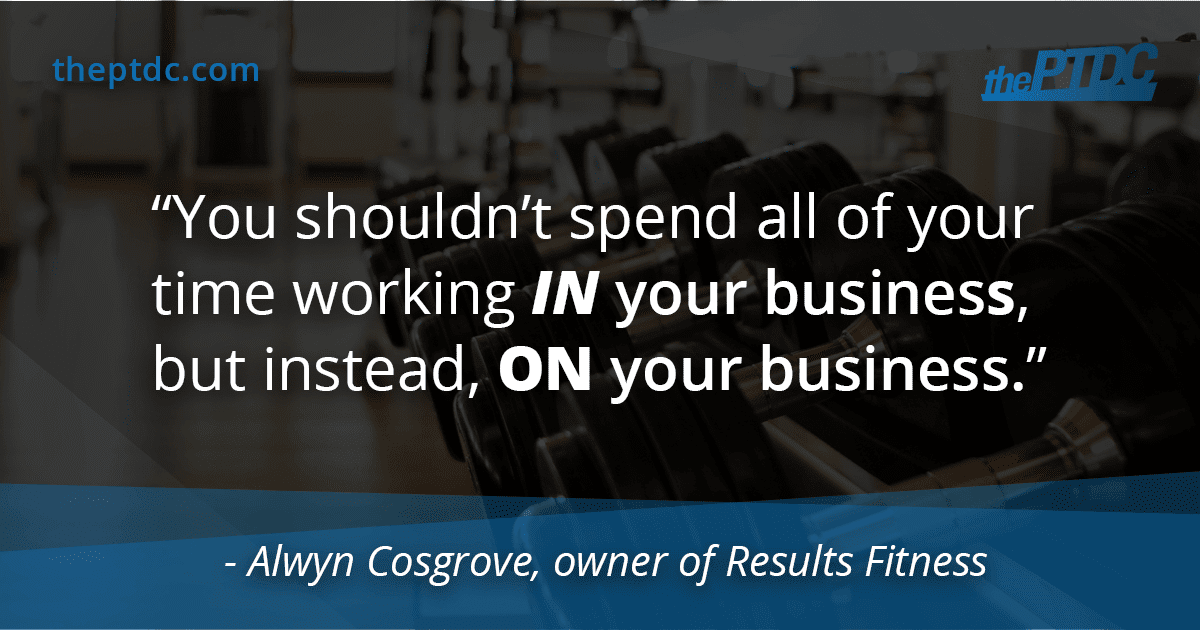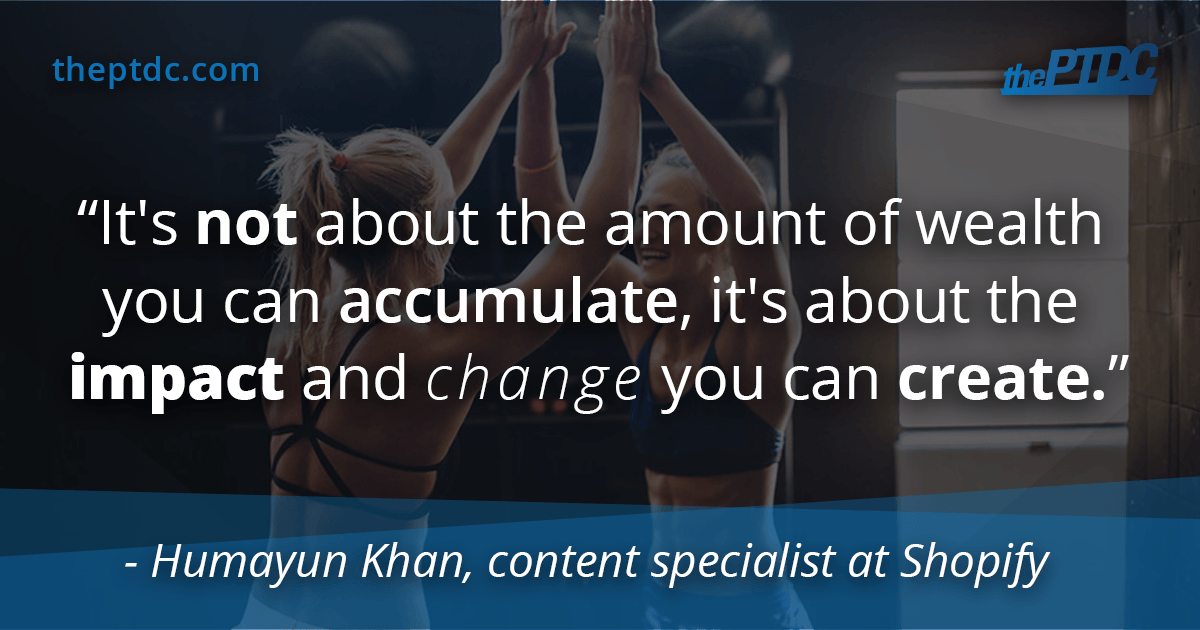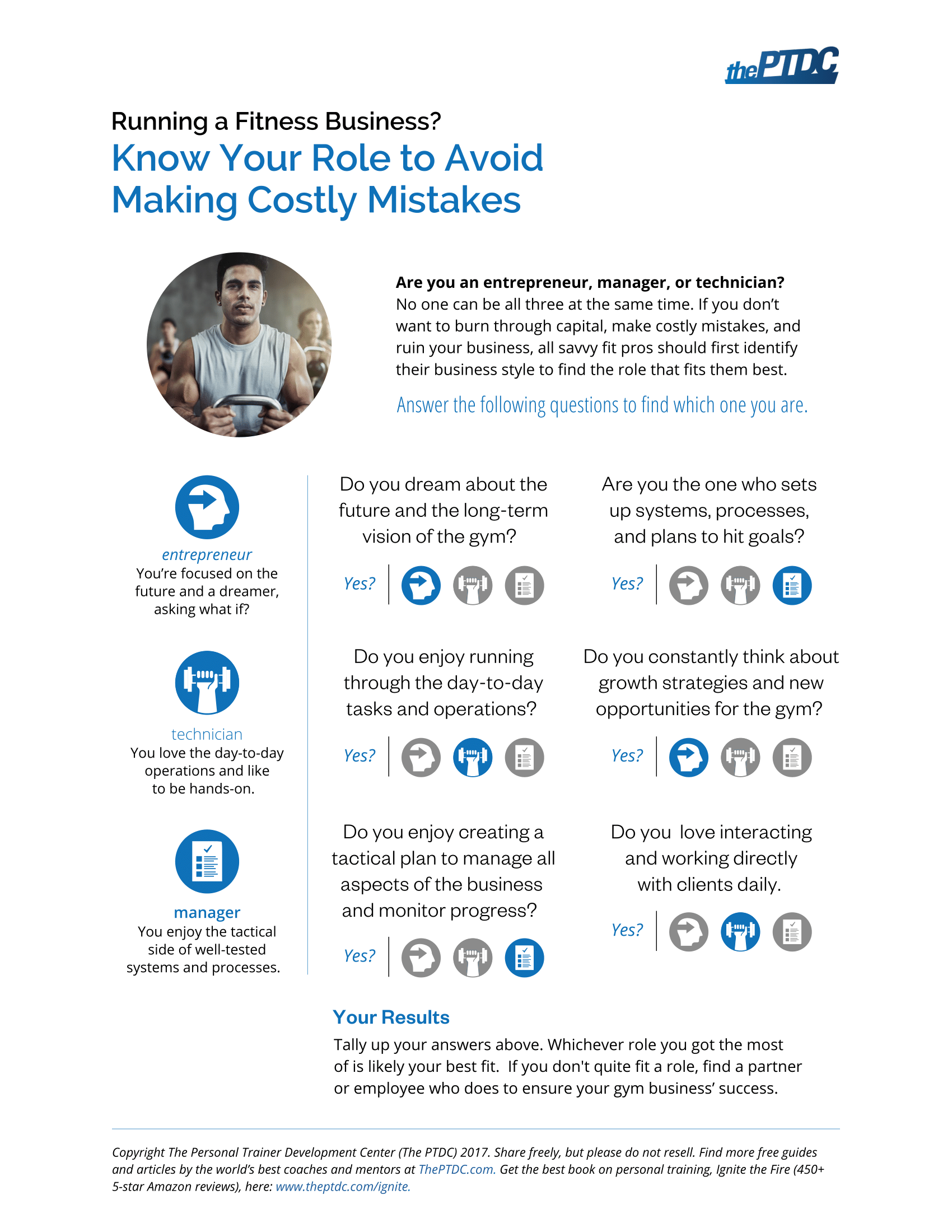In February 2009 my ego got the best of me and made me lose sight of why I wanted to open a gym in the first place. Like Icarus, I had flown too close to the sun, and within a matter of minutes, I lost $75,000.
How did this much cash slip away? Looking back now, I was the one to blame.
In this cautionary tale, my goal is to help you avoid my mistakes by sharing why:
- Why most well-intentioned trainers who open a gym make one crucial mistake from the get-go
- Understanding your strengths is actually the second most important thing
- How not focusing on your “purpose” can lead to TERRIBLE DECISIONS
Let’s start from the very beginning.
“Success” Begat Arrogance Which Begat Blindness
I had just graduated from pharmacy school and was anxious to break my six-year streak as a broke college kid and start a glorious $125,000-per-year career.
I later found out it wasn’t what I wanted.
What I did want came in the form of a gym that had just closed down in my hometown. After one weekend and a single offer, I became a gym owner.
The gym opening was an instant success, which was born from the perfect combination of happenstance.
The gym needed a facelift, so I quickly ordered gym equipment, hired contractors, painted bathrooms, and helped lay flooring. The ongoing construction and its remodeling created buzz around the community for us before we had even opened.
My position as the community pharmacist also helped. When I wasn’t at the gym, I was talking to plenty of potential gym members, and the community was small enough for word of mouth of to travel fast. That, along with the gym’s association to a pharmacist, gave us instant credibility and an influx of gym members as soon as we opened.
We hit our monthly break-even point in one week. It wasn’t long before nearby communities had begun approaching us to open fitness facilities in their towns. One after another the proposals poured in like a flood, but my gym manager and I chose to focus on our facility.
Eighteen months after the first gym’s opening, we decided to expand into a second location in a nearby community. And thus, the second gym was born.
Again success followed. Memberships reached $14,600 in its first month. Because we used a low price, 24-hour access, all-inclusive model $9,600 of that was profit.
I felt as if I had the Midas touch, turning everything I had my hands on into a money-pumping machine, and I couldn’t be touched.
Oh, how I was wrong, mes amis.
The Beginning of the End
I should have noticed the first crack in our armor during the 14th month.
Unfortunately, my revenue number got scrambled (I’ll explain why soon), and worse, my involvement in three other businesses and arrogance kept that egregious error hidden.

I did notice a trend in decreasing total revenue, but instead of being alarmed, I had attributed it to seasonal swings and continued to rely on my one indicator of “success”: my total revenue.
Then one weekend, after trying to straighten out the numbers with my accountant, I was faced with the writing on the wall: the revenue from the second location was reduced by almost half.
For the last few months, it bounced between $6,000 to 7,000, down from the $12,000 to 14,000 it had done during its first 10 months. For the first time, we were barely breaking even, leaving very little room for emergencies. It continued to survive because it was being floated by the first gym, but by the time I’d realized that it was almost too late.
What Would You Have Done in This Situation?
The second gym was bleeding money from the business. A lease renewal was looming in the near future. There were three options:
- Keep it, sign a lease for three more years, invest more money in it, and put the time and effort I did into the first gym into this gym's rebirth.
- Buckle down over the next few months and build it back up as much as possible, then sell it.
- Close it down. Sell the exercise equipment.
All three were viable options. All three kept me up at night. What would you have done?
I played each scenario out over and over again.
I spoke with my accountant. I spoke with my lawyer. I spoke with my mentors. I even spoke with my mailman. In the end, after weeks of deliberation, I found myself sitting on that dumbbell bench and staring at a deal that was $75,000 less than what the second gym originally could’ve gone for.
Retrospective: The Three Mistakes That Cost Me $75,000
After spending the last 18 months reviewing the sale, it was obvious it wasn't just one mistake that sunk that gym, but a handful of them. And they were all because of my ego.
Mistake #1. I Didn’t Build the Business to Sell
I remember receiving three pieces of business advice on three separate occasions. I ended up ignoring them, but I wish I hadn’t.
The first time was from one of my business professors. He told me:
"Start a business. Even if you don't have any interest in owning one, start one. It will help you in more ways than you'll know. And then when you do start it, make sure you build it to sell, even if you think you'll never want to sell it. Start from day one and put a price tag on it."
A few years later, a mentor who had started and sold a few software companies told me to make sure to read Built To Sell by John Warrilow. I did. Twice. He also repeated what Norm Brodsky, the author of The Knack and Inc. magazine columnist, has said on multiple occasions:
“When you build to sell, you learn to look at your business the way a potential buyer would. You become more aware of the company's weaknesses, and you have an opportunity to eliminate them and strengthen the business, thereby creating additional value. Building to sell also leads you to adopt best practices. You'll have a better business as a result--even if your intention is to hold on to it indefinitely, rather than sell it.”
The third time was when I had just signed the lease for my second gym. I met with the accountant to discuss whether we would keep the gym’s books separate or together under one gym. He recommended to keep the books separate just in case I wanted to sell. I half-heartedly agreed. I didn't see a reason to be concerned with such a petty decision since I had no intention of ever selling either location.

Well, there went that theory.
The initial buyer loved the gym and we had struck a deal that we were both happy with.
I gave him my spreadsheets, but my spreadsheets needed to be verified by my actual books, which were a mess. I didn’t listen to my accountant to keep memberships from the two gyms separated. I lumped them together instead. Like a bozo.
The total revenue looked damn pretty, but you couldn't see where any of it came from. In business if it's not on your profit and loss (P&L) statement and can't be verified and then re-verified, it's not real.
The offer was taken off the table thereafter.
The lesson I learned here? Even if you think you'll never sell your gym, build it like you will.
Not only will it increase the sales price if you decide to, but it also makes it easier to get a loan if you decide to expand. At the end of every month for the first two years, sit down with your accountant or bookkeeper and use your P&L and balance sheet to put a price on your gym as if you were going to sell it. You'll be amazed at what monthly decisions influence the true value of your gym.
Mistake #2. I Ignored My Weaknesses
Are you a technician, a manager, or an entrepreneur?
Let me explain. I borrowed this concept from The E-Myth Revisited, which explains each role thusly:
- Technician: “The Technician is the doer. ‘If you want it done right, do it yourself’ is The Technician’s credo. The Technician loves to tinker. Things are to be taken apart and put back together again. Things aren’t supposed to be dreamed about, they’re supposed to be done.”
- Manager: “The Manager is the one who runs after the Entrepreneur to clean up the mess. Without The Entrepreneur there would be no mess to clean up. Without The Manager, there could be no business, no society.”
- Entrepreneur: “The Entrepreneur is the visionary in us. The dreamer. The energy behind every human activity. The imagination that sparks the fire of the future. The catalyst for change. The way he usually chooses is to bully, harass, excoriate, flatter, cajole, scream, and finally, when all else fails, promise whatever he must to keep the project moving.”
So, which one are you?
Actually, that was a trick question. Although world-renowned small business coach Michael Gerber claims that you should be all three, not everyone can be all three.
Don't make the mistake I did and let your ego convince you that you’re a master at all three. If you're a good trainer, you're a good technician. However, you should not assume that because you're good trainer you are also a good manager and entrepreneur.
As Alwyn Cosgrove of Results Fitness puts it,
"You shouldn’t spend all of your time working in your business, but instead, on your business."
The technician would struggle with that suggestion.
Pete Dupuis of Cressey Sports Performance has alluded to the dangers of being just a technician, saying,
“If you don’t trust your team and your systems, you will forever be a slave to your work. Fitness facilities like CSP can’t function on the shoulders of a single individual.”

Take an honest look at yourself and really ask if you can also succeed in the roles of manager and entrepreneur. Do this before you open a gym. Ask your friends, your business acquaintances, and even your clients. Figure out what tasks you enjoy and don't enjoy performing. Here's a quick little quiz to figure out your role:
If you don't fit a role, find a partner or employee who does.
After honest introspection and feedback from my mentors, it was obvious to see that I was not a manager. And in the end, it was the manager's responsibilities (or lack thereof) that had a major influence on the downward spiral of my second gym.
Mistake #3. I Lost Sight of Why I Opened the Second Gym
My first mentor was a businessman who owned multiple pharmacies for over 30 years and was strictly a numbers guy. According to him, your “destination,” or where you want to ultimately be, was found in your bottom line. Although I loved the simplicity and objectivity of his philosophy (as well as his success), it never quite sat right with me. It was in my next mentor that I realized why.
This mentor was a serial software entrepreneur in California who had retired twice, loved a good wine, and rarely spoke about P&Ls or balance sheets. He showed me that business should have a purpose beyond an unidentified dollar amount.
He helped me realize that I was moving in the wrong destination. It turns out that I had opened a second gym without even knowing why. At the time I assumed it was because I enjoyed the first gym so much and any idiot could clearly see that two gyms were better than one.
But I didn't know why specifically I enjoyed the first gym so much. Was it the money? Was it the success? Or was it the relationships I had with my team and gym members? It wasn't until after I had sold the second gym that I realized one of the major reasons behind its eventual demise.
The second gym led me astray from my true values. And I realized later that relationships, not money, was my true calling. The first gym brought me so much joy because of the friendships I had built there. There were countless nights where I spent talking with members in the gym, laughing and basking in the camaraderie (and that was after an eight-hour shift at the pharmacy followed by a three-hour shift at the gym).
These same relationships never had the chance to bud because I was too damn busy with the second gym. With the second gym, I got sloppy. I delegated way too much responsibility to team members and made some decisions that I never would have with my first gym.
Before you make such big decisions, know your “why.” Know your purpose. Know your destination so clearly that when you get there you'll recognize it.

I discovered my why after countless long talks with my second mentor and Tony Robbin's book, The Money: Master the Game. I sat down on a Saturday afternoon with a pencil and pad of paper and pictured how I wanted my life to look. I asked:
- What did my daily routine look like?
- What did my monthly expenses look like?
- How big of a bank account would I need to support it? What truly made me happy (read Stumbling Upon Happiness before you do this)?
- What kind of business would support this? What would it look like?
- What would my role be in it?
- Can it provide my ideal lifestyle?
Spend a weekend alone without a single distraction, and write out your answers to these questions. Although these questions may seem simple, they aren't. They require honesty, deep introspection, brevity, and clarity.
All in all, they're tough.
There are no wrong or right answers; only truth. In fact, Mark Fisher, owner of Mark Fisher Fitness and Business for Unicorns, suggests that you always first ask, “Seriously, what is your reason for creating this business?”
In an interview with Business Insider’s Alyson Shontell, Noah Kagan of Sumo.com and OKDork.com said in reference to a quote from Mark Zuckerberg:
“Working with Mark and hearing that quote reminded me how he was all about doing something great and not just about making money. It’s a healthy reminder to keep doing that and you’ll get whatever success you define for yourself.”
Additionally, a Shopify article by Humayun Khan included this gem from Neil Blumenthal of Warby Parker:
“It's not about the amount of wealth you can accumulate, it's about the impact and change you can create.”

When I rediscovered my purpose, my destination became clearer and it became much easier to make decisions to steer toward that destination.
I picked up the phone, made a call to a friend who approached me a few years ago about opening a gym, and made a deal. Although the paperwork was $75,000 less than the offer from the previously interested buyer (and trust me, that still stung), the guilt disappeared and I was happy.
Are You Opening a Gym for the Right Reason?
You’re probably thinking of opening your own gym soon or someday. But ask yourself: Why?
Be honest.
There’s nothing wrong with starting a gym business to make money. Every business won’t serve some higher purpose. However, there is something wrong with starting a business to make money but not having a clear goal for:
- How much you want to make
- What you plan to do with the money
Otherwise, how do you know you’re on the right path? How do you know when you get “there”?
This goes back to greed, arrogance, and a big ego. If you are opening a fitness center because you simply want to make an arbitrary amount of money that may or may not add any more happiness or security to your life than you already have, then you may be driven by greed. You may not see it now, but it’s likely you won’t get the end result you expect.
If you’re opening a gym because you’ve already had success in the fitness industry and feel like collecting a few more wins, it sounds like you just want to stroke your own ego more. Be careful here, too. You already know how an inflated ego hurt me.
Don’t make the same mistake.











